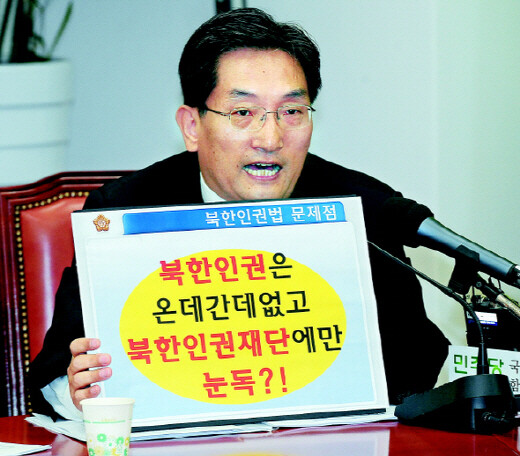hankyoreh
Links to other country sites 다른 나라 사이트 링크
Bipartisan body clashes over N.Korean human rights

By Lee You Ju-hyun, Staff Writer
With the opening of the June session of the National Assembly, the formation of a bipartisan-government consultative body, agreed up by the ruling and opposition parties to discuss pressing public welfare issues such as a parliamentary savings bank audit and university tuition, is facing a snag over North Korean human rights legislation.
The ruling Grand National Party (GNP) has claimed that the act must be passed during this session to promote human rights for North Koreans, while the main opposition Democratic Party (DP) is countering that it is “legislation to support groups distributing flyers to North Korea” and arguing that its own proposed North Korean public welfare and human rights legislation should be reviewed at the same time.
The GNP and DP bills are as different as oil and water. The GNP attaches a number of conditions to humanitarian aid for North Koreans, including its transmission, distribution, and monitoring according to international standards and restrictions on use for other purposes, including military use. The bill codifies into legislation the rationales offered by the government to date in suspending rice aid to North Korea.
In contrast, the DP legislation stipulates unconditional humanitarian aid. No separate demands are made for transparency in its distribution, and the bill includes specific duties related to humanitarian aid, including assistance with food, fertilizer, medicine, machinery, medical equipment, and education.
The two parties also show diametrically opposed positions on the method of approaching North Korean human rights. The GNP presented legislation containing stipulations about the creation of a North Korean human rights foundation and support for private groups working for North Korean human rights, arguing that the government needs to take direct action to improve the North Korean human rights situation. The DP is countering that direct government intervention, far from leading to improvements in North Korean human rights, is more likely to be skewed for political purposes.
Senior DP deputy floor leader Noh Young-min said, “The Grand National Party itself has said that the North Korean human rights bill is intended to build North Korean human rights infrastructure in South Korea.”
“It is a bill that gives money to conservative groups and positions to conservative figures under the packaging of North Korean human rights,” Noh said.
With no narrowing of differences between the parties, the GNP presented a new negotiation plan to the DP on Thursday asking for a change in the name of the bill.
Senior GNP deputy floor leader Lee Myung-gyu said, “We have been told it is impossible in working-level to have a merged review process if the bills have different names, so we asked the DP to put a new name on the bill, even if it leaves the same content in place.”
But an official with the National Assembly Secretariat’s legislation division said, “There is absolutely no connection between different names on legislation and the merged review process.”
Observers say the GNP is likely to face a greater political burden with continuing to ignore other public welfare issues linked with North Korean human rights bill.
Lee Myung-gyu said, “It is a burden to link the parliamentary audit and bipartisan-government consultative body to the North Korean human rights bill, but it is also difficult to proceed with them separately.”
“We plan to try discussing things with the Democratic Party again tomorrow.”
Please direct questions or comments to [englishhani@hani.co.kr]
Editorial・opinion
![[Guest essay] The real reason Korea’s new right wants to dub Rhee a founding father [Guest essay] The real reason Korea’s new right wants to dub Rhee a founding father](https://flexible.img.hani.co.kr/flexible/normal/500/300/imgdb/original/2024/0423/8317138574257878.jpg) [Guest essay] The real reason Korea’s new right wants to dub Rhee a founding father
[Guest essay] The real reason Korea’s new right wants to dub Rhee a founding father![[Column] ‘Choson’: Is it time we start referring to N. Korea in its own terms? [Column] ‘Choson’: Is it time we start referring to N. Korea in its own terms?](https://flexible.img.hani.co.kr/flexible/normal/500/300/imgdb/original/2024/0423/3617138579390322.jpg) [Column] ‘Choson’: Is it time we start referring to N. Korea in its own terms?
[Column] ‘Choson’: Is it time we start referring to N. Korea in its own terms?- [Editorial] Japan’s rewriting of history with Korea has gone too far
- [Column] The president’s questionable capacity for dialogue
- [Column] Are chaebol firms just pizza pies for families to divvy up as they please?
- [Column] Has Korea, too, crossed the Rubicon on China?
- [Correspondent’s column] In Japan’s alliance with US, echoes of its past alliances with UK
- [Editorial] Does Yoon think the Korean public is wrong?
- [Editorial] As it bolsters its alliance with US, Japan must be accountable for past
- [Guest essay] Amending the Constitution is Yoon’s key to leaving office in public’s good graces
Most viewed articles
- 1[Guest essay] The real reason Korea’s new right wants to dub Rhee a founding father
- 2[Column] ‘Choson’: Is it time we start referring to N. Korea in its own terms?
- 3Why Korea shouldn’t welcome Japan’s newly beefed up defense cooperation with US
- 4Senior doctors cut hours, prepare to resign as government refuses to scrap medical reform plan
- 5Terry Anderson, AP reporter who informed world of massacre in Gwangju, dies at 76
- 6New AI-based translation tools make their way into everyday life in Korea
- 7[Column] The clock is ticking for Korea’s first lady
- 8Opposition calls Yoon’s chief of staff appointment a ‘slap in the face’
- 9[Column] The president’s questionable capacity for dialogue
- 10Korean government’s compromise plan for medical reform swiftly rejected by doctors